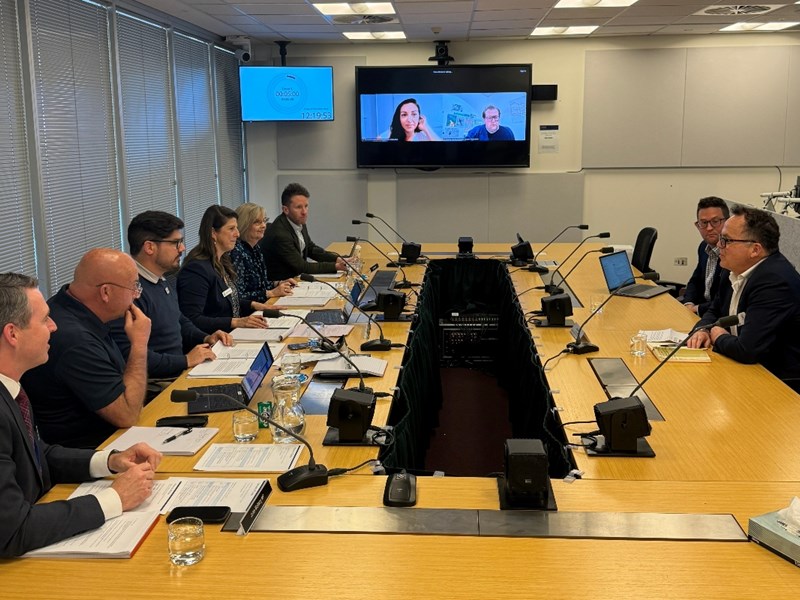New technologies risking ‘mental privacy’ of workers
13 May 2025 Read committee report
Imagine your employer having access to your brain activity.
It may sound fanciful, but neurotechnology is one of a range of emerging technologies that are finding their way into workplace surveillance and will need to be subject to carefully considered regulation, according to a new report tabled in the Legislative Assembly.
The Legislative Assembly Economy and Infrastructure Committee inquired into workplace surveillance in Victoria, finding it has accelerated in recent years as a result of technological advancements and the shift towards remote working.
Surveillance has moved beyond camera footage and the recording of telephone calls to incorporate keylogging, wearable trackers, biometrics, neurotechnology and artificial intelligence, the inquiry found.
‘Existing legislation hasn’t kept pace with the dramatic changes that have occurred in recent decades and isn’t really protecting workers’ privacy,’ said Committee Chair Alison Marchant.
The report identified neurosurveillance, the use of neurotechnology to determine employees’ cognitive state such as their level of attention and effort, as one technology expected to be adopted by workplaces within the next five years.
'Neurotechnologies such as electroencephalograms (EEGs), which measure electrical activity in the brain, and transcranial direct current stimulation, which uses low‑intensity electrical currents to modify brain activity, are currently used in Australian workplaces such as mines to monitor attention and fatigue,’ the report said.
‘Other neurotechnologies exist that can decode mental images and intended speech, and these could also be introduced to workplaces in the future to understand employees’ minds and modify their work performance,’ it said.
The report concludes that neurosurveillance can be beneficial for safety reasons, especially for jobs that require high or sustained levels of concentration.
However, using it to boost productivity, for billing purposes (to measure billable units of attention) and for hiring, promoting and firing staff has the potential to be problematic and in some cases discriminatory if it overlooks other relevant factors such as empathy and creativity.
The report recommends the Victorian Government introduce new workplace surveillance laws that are technology neutral and ensure surveillance is reasonable, necessary and proportionate to achieve a legitimate objective.
‘It became clear throughout the inquiry that many Victorian workers are unaware of the extent of surveillance in their workplace and how their employers are handling and storing data collected through workplace surveillance,’ Ms Marchant said.

While neurosurveillance is an emerging potential threat to worker privacy, many other forms of surveillance have crept into Victorian workplaces already.
The report finds that ‘devices such as computers, webcams, mobile phones and handheld scanners gather data on work activities that can be processed and used to determine workers’ location and task speed and assess their performance, sentiment and concentration level’.
The University of Melbourne’s Jake Goldenfein, who has researched these practices in the warehousing sector, told the Committee how these tools can heighten the risk of workplace accidents.
‘Well, I’m working in a coolroom. I have a little iPad with a countdown clock telling me how much time I have left to finish packing this box, and when it hits zero it goes red, right, and I know I’m in trouble. At the same time I’m a smaller person and I need to grab things off the shelf, but the stairs, the ladders, are all the way down the other end of the room. So I just climb the shelf.’
Employers are also using artificial intelligence to process workplace surveillance data and reach conclusions about workers’ behaviour, sentiment and performance using algorithms.
Nicole McPherson, National Assistant Secretary, Finance Sector Union, told the inquiry that one of their union members had been flagged for a disciplinary process by AI monitoring after using the seemingly negative phrase ‘unfortunately it’s been really rainy lately’ during an interaction with a client.
‘We all know the enormous stress of being involved in a disciplinary process; even if it ultimately turns into nothing, it is still a really difficult thing to go through,’ Ms McPherson told the inquiry.
The Committee has proposed that legislation include requirements for Victorian employers to notify and consult with workers about workplace surveillance practices and disclose how workers’ data will be collected, used and stored.
'Victoria has the opportunity to lead the way with dedicated laws requiring workplace surveillance to be necessary and reasonable,' Ms Marchant said.
The Committee received more than forty submissions and held four days of public hearings.
The report, which is published on the Committee’s website, contains 29 findings and makes 18 recommendations.